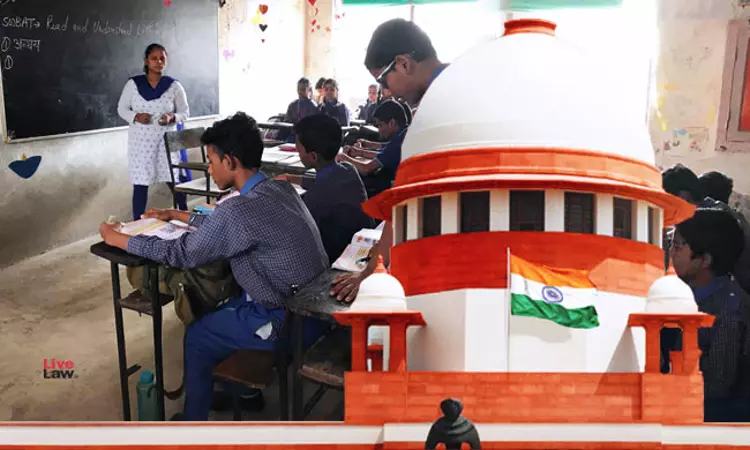 Image Source: Live Law
Image Source: Live Law
Supreme Court Calls for Fair Pay and Dignity for Teachers in Landmark Ruling
In a significant ruling delivered on August 22, 2025, the Supreme Court of India affirmed the imperative that respect for teachers must be tangible—not just in words but in fair pay and dignified treatment. The court expressed serious concern over the persistent undervaluation of educators, observing that inadequate compensation and lack of dignity undermine the very foundation of a country’s intellectual and academic strength.
The judgment arose from appeals challenging the pay disparity faced by contractual assistant professors in Gujarat, many of whom earn as low as ₹30,000 per month despite performing the same duties as regularly appointed faculty. The bench, comprising Justices P.S. Narasimha and Joymalya Bagchi, emphasized the role of teachers as the “intellectual backbone” of the nation—those who shape minds, craft characters, and build the future generation’s foundation.
The Court’s Core Message: Pay and Dignity Reflect National Values
The Supreme Court declared that it is not sufficient to merely invoke traditional reverence for teachers through mantras such as "gurubrahma gururvishnu gurudevo maheshwarah" at ceremonial occasions. True respect must be expressed by ensuring equitable pay and working conditions. Failing to do so diminishes the value a nation places on knowledge and hampers educators' motivation to contribute to nation-building.
Justice Narasimha noted:
“When educators are not treated with dignity or offered respectable emoluments, it diminishes the value a country places on knowledge and undermines the motivation of those entrusted with building its intellectual capital.”
Addressing Disparities and Ensuring Equality
The court specifically applied the principle of “equal pay for equal work” in directing that contractual assistant professors in Gujarat be entitled to the minimum pay scale applicable to regular faculty. The bench expressed discomfort that many lecturers have subsisted for close to two decades on meagre salaries, despite fulfilling all academic duties.
In practical terms, the judgment calls for States and institutions to:
-
Rationalize pay structures based on duties performed rather than contractual status
-
Remove inequities that erode teacher morale and diminish educational quality
-
Recognize educators’ roles with compensation that befits their central place in society
Broader Implications for Education and Governance
This ruling sends a strong signal across India’s educational landscape, where ad hoc and contractual appointments have proliferated to fill staffing gaps. The Court criticized the financial expediency of states that resort to such arrangements without ensuring fair pay, urging governments to prioritize dignity alongside budgetary concerns.
In essence, the judgment reinforces that:
-
Teachers are not expendable employees but nation-builders deserving of respect
-
Equal pay and dignified treatment are non-negotiable components of quality education systems
-
The State must demonstrate its commitment to intellectual capital through substantive action, not just rhetoric
Public Reaction and Expert Commentary
The verdict has been widely lauded by educational activists and policy experts as a landmark step toward improving the teaching profession's stature. It echoes earlier jurisprudence and global norms that link quality education directly to faculty morale and fairness.
Experts highlight that this ruling could potentially spur reforms in multiple states, encouraging them to raise contractual faculty wages, improve working conditions, and adopt transparent recruitment policies that ensure parity.
Conclusion: A Call to Action for Respecting Educators
The Supreme Court’s ruling is more than a legal decree; it is a clarion call for all stakeholders—governments, educational institutions, and society—to genuinely honor teachers. It insists that reverence for educators, a cornerstone of Indian culture, must find its true expression in pay scales and working dignity reflecting their crucial role.
As India strives to harness its demographic dividend, investing in teachers through fair compensation and respect is foundational for fostering innovation, knowledge, and a brighter future for all its youth.
Relevant Sources: LiveLaw, PTI via The Week, India Today, Bharatchugh.in
Advertisement
Advertisement






